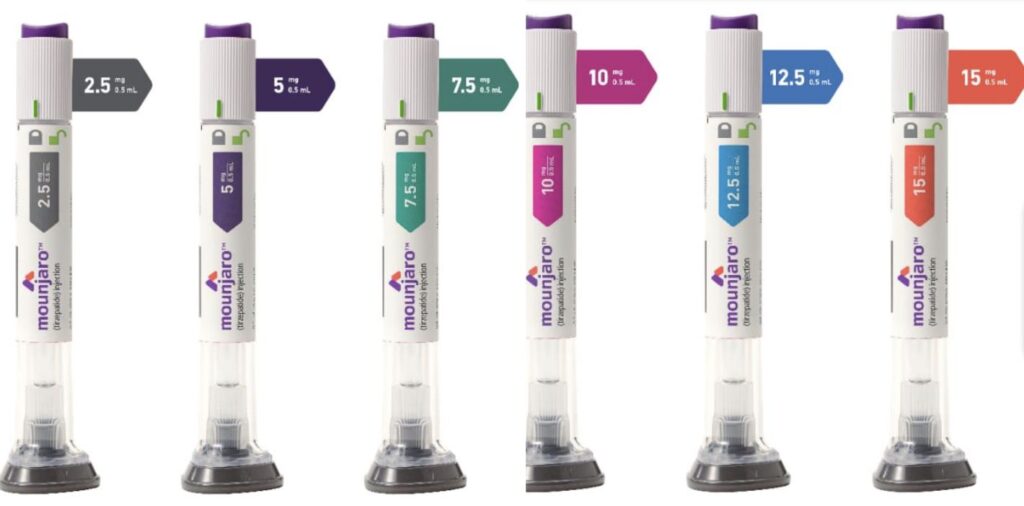Mounjaro is a game-changing new weight loss medication by Eli Lilly and Company that is now FDA -approved. Mounjaro® is a Glucagon-like peptide-1 (GLP-1) agonist such as Wegovy® but has an edge over Wegovy as you will see very soon.
It is a once-weekly injectable medication that helps regulate blood sugar levels. It is indicated currently for use in patients with type 2 diabetes, but it shows promise as a weight-loss medication as well.
Mounjaro® is meant to be used alongside lifestyle changes especially as pertains to your food (diet), sleeping habits and exercise. There are trained professionals that can assist in coaching and support to enable utmost compliance for the best results when taking Mounjaro.
Dosage Forms and Strengths of Mounjaro
Mounjaro® comes in prefilled, single-dose pen as a solution for injection. Mounjaro is available in six doses. Each pen contains one dose of Mounjaro®, either 2.5 mg, 5 mg, 7.5 mg, 10 mg, 12.5 mg, or 15 mg.
How Does Mounjaro Work in Weight Loss?
Mounjaro® is the first and only dual glucose-dependent insulinotropic polypeptide (GIP) receptor and glucagon-like peptide-1 receptor agonist (GLP-1 receptor agonist) for treating adults with type 2 diabetes.
Combining GIP and GLP-1 receptor agonists can have a more significant impact on metabolic dysregulation, an impressive impact indeed in treating obesity.
As stated above, it can be seen clearly that Mounjaro has an edge over other medications for weight loss in the GLP-1 family. It has a dual action design, mimicking the action of not one but two incretin hormones, the GIP and GLP-1.
According to a press release by Eli Lilly, “GIP is a hormone that may complement the effects of GLP-1 receptor agonists. In preclinical models, GIP has been shown to decrease food intake and increase energy expenditure, therefore, resulting in weight reductions, and when combined with GLP-1 receptor agonist, may result in greater effects on markers of metabolic dysregulation such as body weight, glucose and lipids.”
Incretin hormones are released whenever food is consumed. Among other things, they help promote a feeling of fullness by delaying gastric emptying and activating the satiety centres of the brain. They also boost insulin production in the pancreas and suppress glucagon production, both of which help normalize blood sugar.
All of this happens in a glucose-dependent manner, which means incretin hormones or their imitators (GLP-1 AND GIP receptor agonists) are unlikely to cause severe hypoglycemia.
It was discovered through studies that people that are overweight or obese may have a reduction in incretin effects, particularly if they have had frequent weight fluctuations due to “yo-yo dieting”. GLP-1-type medication narrows the gap, making it easier to reach your goals and lower your metabolic set point.
How to Take Mounjaro For Weight Loss
Mounjaro® is a once-weekly injection that is given subcutaneously. You initiate treatment with the lowest dose, 2.5 mg once weekly which is then increased by 2.5 mg every 4 weeks during the dose escalation period to reach a maintenance dose of up to 15 mg once weekly by week 20.
It can be given with or without meals at any time of the day and maintained the same day of the week subsequently. Follow the directions on your prescription label carefully, and ask your doctor or pharmacist to explain any part you do not understand. Use exactly as directed.
Do not take more or less of it or take it more often than prescribed by your doctor. You may change the day of the week you inject this medicine as long as at least 3 days have passed between doses. Mounjaro® can be injected in the abdomen, thigh or upper arm. Rotate injection sites with each dose.
If you miss a dose of Mounjaro®, as soon as you remember take it, provided it is within 4 days after the missed dose. However, if more than 4 days have passed, skip the missed dose and continue your regular dosing schedule. Do not inject two doses within 3 days of each other.
In case of an overdose, get help as soon as possible by calling emergency services.

Side Effects of Mounjaro
Let us look at some of the possible side effects of Mounjaro® which are common and they include:
- Nausea
- Diarrhoea
- Decreased appetite
- Vomiting
- Constipation
- Indigestion
- Stomach (abdominal) pain
Talk to your healthcare provider about any side effects of Mounjaro® that become bothersome or that don’t go away. If you experience any allergic reaction such as anaphylaxis or shortness of breath, please seek immediate medical care.
Contraindications
Mounjaro® is contraindicated in patients with:
- A personal or family history of medullary thyroid carcinoma (MTC)
- A personal or family history of Multiple Endocrine Neoplasia Syndrome type 2 (MEN 2)
- Known serious hypersensitivity to tirzepatide (Mounjaro®)
Warnings and Precautions
- Pancreatitis has been reported in clinical trials. Discontinue promptly if pancreatitis is suspected.
- Concomitant use with an insulin secretagogue or insulin may increase the risk of hypoglycemia. Reducing the dose of insulin secretagogue or insulin may be necessary.
- Hypersensitivity reactions have been reported. Discontinue Mounjaro if suspected.
- Doctors are instructed to monitor kidney function in patients with renal impairment who are reporting severe adverse gastrointestinal reactions.
- Use may be associated with gastrointestinal adverse reactions, sometimes severe. Has not been studied in patients with severe gastrointestinal disease and it is not recommended in these patients.
- Mounjaro® has not been studied in patients with non-proliferative diabetic retinopathy requiring acute therapy, proliferative diabetic retinopathy, or diabetic macular oedema. Doctors are instructed to monitor patients with a history of diabetic retinopathy.
- Acute gallbladder disease has occurred in clinical trials. If cholelithiasis is suspected, gallbladder studies and clinical follow-up are indicated.
Limitations of Use
Mounjaro® is a glucose-dependent insulinotropic polypeptide (GIP) receptor and glucagon-like peptide-1 (GLP-1) receptor agonist indicated as an adjunct to diet and exercise to improve glycemic control in adults with type 2 diabetes mellitus.
- Mounjaro® has not been studied in patients with a history of pancreatitis
- Mounjaro® is not indicated for use in patients with type 1 diabetes mellitus
Is Mounjaro Approved For Weight Loss?
You may want to know if Mounjaro® is approved by FDA or not. As of May 2022, Mounjaro® was approved by FDA for use in patients with type-2 diabetes mellitus and not for weight loss alone.
There is evidence that its active ingredient is safe and effective in treating overweight or obesity. It is an effective tool for weight loss among both adults with type-2 diabetes and in the prediabetic stage.
Is it Effective?
Clinical data on Mounjaro® weight loss shows that participants were able to drop between 5% and 22.5% of their total body weight. Those are impressive stats, given that people taking many existing FDA-approved medications for obesity, on average, lose between 5% and 10% of their body weight.
Preliminary results released from a clinical trial by Eli Lilly showed that people with excess weight or obesity who had at least one other comorbidity (but not diabetes) had a weight reduction of up to 52 pounds during the 72-week Mounjaro® trial.
Mounjaro®(Tirzepatide) weight loss varied by dose. Study participants on a 5 mg dose of Mounjaro® for weight loss experienced an average weight reduction of 35 pounds or 16% of their body weight. Those on a 10 mg dose lost an average of 49 pounds or 21.4% of their body weight.
On the highest dose-15 mg- people on Mounjaro® lost an average of 52 pounds or 22.5% of their body weight. On the other hand, the placebo group lost just pounds, or 2.4% of their body weight, over that same amount of time.
What Makes Mounjaro Ahead of Other GLP-1 Medications?
Mounjaro® emerged as a clear winner in glycemic control and weight loss. This is because Mounjaro is not just a GLP-1 agonist but because it also contains a GIP agonist, having dual action in mimicking two key hormones involved in the regulation of insulin release and appetite.
Conclusion
Mounjaro® is the “next big thing” in weight loss and diabetes pharmacology. It has real numbers- and impressive clinical trial results – to back it up.
Mounjaro® is FDA-approved for use in adults with type-2 diabetes. However, there is proof that its active ingredient, tirzepatide, is safe and effective in treating overweight or obesity.
In summary, Mounjaro® is a dual GIP and GLP-1 receptor agonist and the very first medication of its class. It works the same way, as GLP-1 receptor agonists, like Ozempic® or Wegovy® but has a dual–action design that works on the second type of receptor: Glucose-dependent insulinotropic polypeptide (GIP).
The distribution of Mounjaro® in the United States began in June 2022, and the medication may not be available everywhere at this time.
If you feel that you need to use Mounjaro® for weight loss, please consult your doctor to guide and monitor you after assessing the suitability for you. This article is strictly for educational purposes. Your healthcare professional must be involved in your treatment if you want to see your desired outcome!

